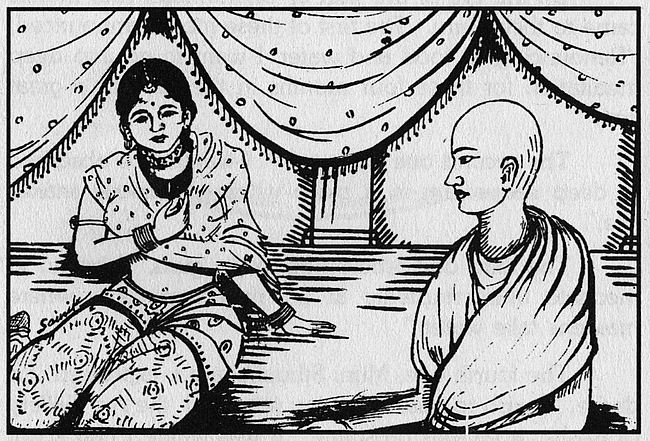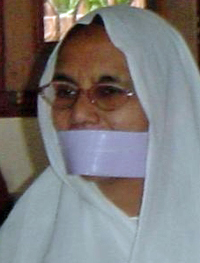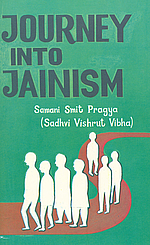Having been initiated as a muni, Sthuulibhadra was completely engrossed in the religious study of scriptures as well as spiritual practice. On account of his sharp intellect, he became well conversant with the Agmas.
On the eve of the start of Chaturmaas, four monks came to their Guru. The first of these monks announced, "Renouncing all food and water, I want to go into deep meditation for these four months in the cave of a great lion."
The second one declared, " I want to be absorbed in deep kaayotsarg in a place where poisonous snakes live."
The third one proclaimed to the guru, "I intend to meditate uninterruptedly at a river-bank from where maidens take water."
The fourth one, Muni Sthuulibhadra, expressed his desire, "I wish to pass this rainy retreat at the Art Gallery of Kosha, a famous prostitute. It was where I had spent my past twelve years. Now I shall perform a particular penance there."
Judging their capabilities, the Guru allowed them to do as they had planned. The first three monks reached their respective destinations and became absorbed in meditation, penance and study.
Muni Sthuulibhadra arrived at the residence of Kosha in Patliputra. As she watched him coming to her home, she immediately forgot any past disappointments and sorrow. When Muni Sthuulibhadra said, "I want to spend my Chaturmaas in your art gallery," Kosha was ecstatic. She exclaimed, "O holy sir! How lucky I am! Please treat this art gallery as your own. I am also for you. There is no need to seek permission from anyone else. I have been waiting for you."

When muni Sthuulibhadra said "I want to spend my chaturmass in your art gallery", Kosha was ecstatic. She explained, 'O holy Sir! How lucky I am! Please treat this art gallery as your own. I am also for you.
The Chaaturmaas began. Muni Sthuulibhadra engaged himself wholeheartedly in the deep study of scriptures and meditation. Occasionally, Kosha would express her feelings to him and remind him of their previous love for each other. Muni Sthuulibhadra heard her reminiscences, but never commented.
When all her efforts failed to bear fruit, and she lost all hopes of winning him over, Muni Sthuulibhadra spoke some soothing words, "Kosha, there was a time when we were attached excessively in the bond of love. At that stage, the whole universe seemed insignificant except us. We thought we were in pure ecstasy, but in reality it was just illusion. True happiness cannot be achieved through any person, substance, or circumstance. It is absolute and is the true nature of the soul. Before, I was attracted to you, but since my fathei's demise, I have obtained a greater understanding. Now I am able to dive deep into reality and to experience a true and indescribable joy. I have pure feelings towards you; you seem to me to be my sister, and you should also view me as your brother."
These beautiful words from a spiritual practitioner melted the heart of Kosha. Detachment took shape instead of sexual instincts. Muni Sthuulibhadra gave his lecture for four months, and changed the heart of Kosha. He had come there with the moral purpose of giving her true knowledge and of revealing the path to a virtuous, meaningful life. In this attempt he had succeeded. Kosha was thereafter a religious householder, a follower of the twelve vows enjoined upon a laywoman.
At the end of Chaaturmaas, all the monks except Sthuulibhadra came before the Guru, who gave them due regard and praised them for performing their severe penance successfully. At last, Muni Sthuulibhadra arrived and bowed down at the lotus feet of his Guru. All were looking at him, waiting to see what the Guru would say to him who had not undergone any penance during his chaaturmaas.
The Guru received him warmly, "Oh, welcome! you have performed the most difficult job." The other monks were astonished to hear these words. The monk who had spent his Chaaturmaas in the cave of a lion thought to himself, "We three monks, who did severe penance at the risk of our lives, were blessed with only the expression 'difficult task'. While he who enjoyed the pleasures of the prostitute's house for four months has been addressed as the doer of the 'most difficult task. It shows that the Guru is prejudiced. Because Sthuulibhadra is the son of the minister, a special favour is shown towards him. Well, if I too pass the next Chaaturmaas there, will our guru think as highly of me?"
As the time of the next Chaaturmaas came near, and the monks again made their requests, the monk who had passed the former Chaaturmaas in the lion's cave now asked to be allowed to spend the four months at the house of Kosha. The wise Guru immediately comprehended the situation, and politely explained to the monk, "It is an extremely difficult task. Please believe me when I say that you cannot do justice to it. You cannot do any penance with feelings of jealousy. Remember that we are leading lives of sadhaks."
The muni, however, lost his temper and exclaimed, "Nothing is too difficult for me. I have decided to go there and am resolute in my decision." The guru tried to discourage him further, "It is not suitable for you. If you
go there, you will deviate from your accumulated virtues. You will not succeed in your attempt."
Neglecting the Guru's advice, the muni left for his destination, at last reaching the house of Kosha. Kosha perceived the hidden meaning of the monk's arrival. Now that she was a religious householder, she felt it her duty not to let the monk deviate from his path.
As the Chaaturmaas progressed, the muni lived too comfortable a life, enjoying such pleasures and luxuries as tasty meals and idleness. Furthermore, as the beauty of Kosha was ever in front of him, he gave up all religious activities, and put forth a proposal before her. The conversation went as follows:
Kosha - Muni!You know that we covet money. Therefore, tell me what you possess.
Muni - How can we have money? We are but monks.
Kosha - Well, we follow a rule of excessive attachment to wealth. If we do not, how can we lead our lives?
Muni - Is there any way out of it?
Kosha - (after some thought)- There is one way, but that depends only on your succeeding in it. It might prove to be a difficult job.
Muni - What is it? I do not regard any task too difficult for the sake of you.
Kosha - Well, the king of Nepal gives away a jewel rug worth one and a quarter lakh rupees. If you could bring it, your desire shall be fulfilled.
Thus, mad in his love for Kosha, the muni completely forgot the code of conduct befitting monkhood and left for Nepal in a state of obsession. After confronting a great many hardships, the monk finally arrived before the king, who then gave him the jewel rug. As he began leaving Nepal, however, the people advised him to conceal it so that robbers might not steal it. Now he cautiously hid the rug in the hollow of a bamboo stick which he carried on his shoulder, and continued on his way.
On his way to Kosha's house, a parrot uttered the words, "One lakh rupees are being brought through this path." As a result, some thieves came out of hiding and approached the monk. When they could not find anything, and the monk pleaded, "I have no precious thing," they at last released him.
As he continued his journey towards Patliputra, however, the parrot again cried about the one lakh rupees. This cry brought forth the chief of the thieves, who accosted and searched the muni. The monk again replied that he had nothing with him. To this, the chief said that the parrot had never told a lie. After receiving severe rebuke from this chief, Muni finally became helpless and narrated the whole episode to the chief, and prayed for the rug for himself. The chief, feeling compassion for the poor monk, did not snatch the jewel rug after all.
The muni proceeded on his journey and eventually reached the house of Kosha. The pleased monk eagerly told her, "1 have brought the jewel rug for you. Now you should accept my proposal." At this, Kosha replied, "I am ready for you, but first, I shall take my bath."
The, muni waited for her. As Kosha emerged from the bathroom, she wiped her feet on the expensive rug, and then dropped it into a dirty drain. For this, she was reprimanded by the monk, who angrily exclaimed, "You seem to be an idiot. You don't know how much I had to go through to procure it. How could you throw it in such filth?"
Kosha exhibited a look of surprise and inquired, "What is the matter?" Muni indignantly declared, "You do not perceive the importance of this rug and the hard efforts I have made to obtain it. Do you not know the value of it? You cannot get such rugs in your lifetime. You should have handled it very carefully."
Kosha, now feeling extremely sad, told the muni, "You should ponder deeply over this incident. What are you doing? You are worried about the rug, but not about your own soul. You see the hill burning but you cannot see what is going on under your sole."
The muni had forgotten his aim in life completely. He could not understand the meaning of Kosha's words. He was concerned only about the beauty of Kosha. He impatiently asked, "What are you talking about? Did you forget my proposal?"
Kosha replied scoldingly, "I did not forget your proposal. Forget me for one minute and look into your heart. You were born in a noble family. With the feeling of great detachment, you have renounced your property and family. You have done much penance. Why are you now getting enamored of me? When you accepted the noble path, had you any exception for me? Muni, you have paid much attention to this rug, but you have forgotten your own soul."
She further said, "You claim you love me, but don't you believe that the carnal desires of yours are totally responsible for causing all the troubles you have undergone. You are leaving your sadhana in exchange for the flesh. Out of sheer foolishness, you have forgotten your vows. You envied Sthuulibhadra, but you are no match for him. We loved each other for twelve years, and when he was back in my life again, I was restless for him. Yet he did not deviate from his path. He did not bend before me but made me an ideal woman. When you came here, you were firm on your ideals, and 1 was the same in my vows. Yet you slipped from the right, moral path. Do you believe it to be good? Do you realize the value of human life?"
Hearing this sharp rebuke, realization dawned on the monk. He was ashamed of himself and was filled with self- condemnation.
Again did Kosha speak, "Even now, the time has not passed. You have not fully strayed from your path. It is time for you to go to your guru, take the repentance, and achieve purity once more. He will show you the right path. Also, forgive me for the trouble I have caused you, but it was only to make you perfect in your sadhana.
Immensely inspired by Kosha's words, Muni went to the guru, took repentance, and became pure.
 Sadhvi Vishrut Vibha
Sadhvi Vishrut Vibha
